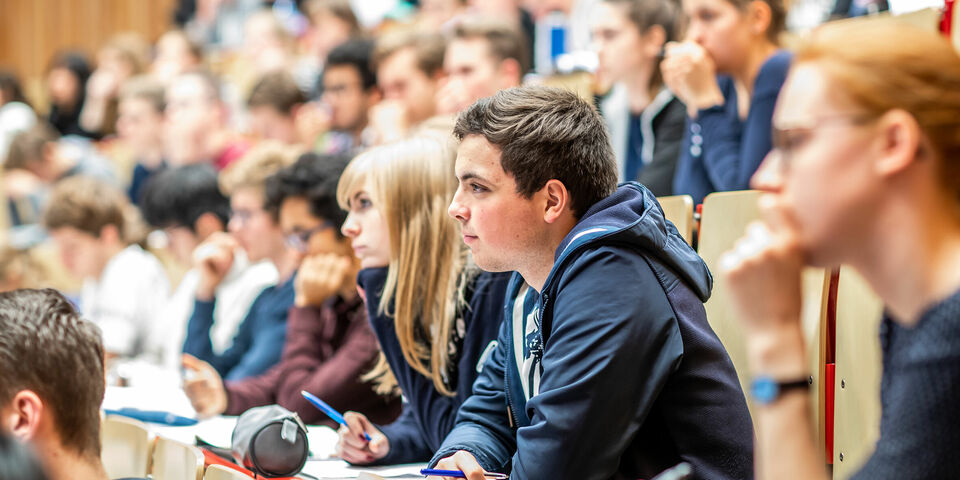From 30 August, students will no longer have to observe social distancing, Prime Minister Mark Rutte announced last Friday at the government’s latest press conference about the coronavirus pandemic. This is three weeks earlier than recommended by the experts.
But the brakes are not being released entirely. Face masks will still be mandatory in corridors and hallways, and no more than 75 students will be allowed to gather at the same time in lecture rooms. In addition, higher education institutions have to keep their buildings well ventilated and must have a variety of walking routes so as to avoid crowding.
The cabinet also expects students to do a self-test twice a week and to stay home if they do not feel well. The hand sanitising stations will not be removed for the time being either.
Who is happy about this?
It is an “enormous relief for everyone”, tweeted Pieter Duisenberg of the Association of Universities in the Netherlands, VSNU. Maurice Limmen of the Netherlands Association of Universities of Applied Sciences is happy too and says the relaxations are “of great importance”.
Mirjam van Praag, chairperson of the Vrije Universiteit Amsterdam appeared on talk show Op1. “Everyone is delighted”, she said about the relaxations. “I actually got tears in my eyes.” During the same broadcast, Ama Boahene of national student organisation LSVb said that she too was “very happy” that social distancing will no longer be required in higher education. “It simply had to happen and there was really no alternative.”
Was there no criticism at all?
The maximum of 75 students in a group has been met with annoyance. “And I don’t really understand where that figure comes from”, said Boahene. You could surely allow more students in some of the larger lecture rooms, she suggested. Van Praag nodded.
Isn’t it risky to relax the rules?
Yes, there are risks. Virologist Ab Osterhaus – also a guest on Op1 – expressed his concerns, and strong criticism is being voiced elsewhere too. The higher education sector will become a “fast track for the virus”, predicts UvA professor of Political Science John Grin in De Volkskrant. Philosopher Jeroen de Ridder of The Young Academy is also afraid that the virus could flare up again.
Not all students are keen on the relaxations either. Of the 700 students on the opinion panel of current affairs programme EenVandaag, only half are in favour of the relaxations, while 39 percent consider the reopening a bad idea. Some young adults cannot get vaccinated, because of an auto-immune disease for example, and some of them are in a state of panic, reportsHet Parool.
Cold feet, or...?
The critics feel that the OMT is on their side. Don’t introduce the relaxations until 20 September, was the advice of the experts. The OMT predicts clusters of infections “and consequent unrest” if the cabinet scraps the measures earlier.
What makes the OMT think that?
Students are returning from their holidays and could be bringing the virus back with them. Moreover, not everyone who wants to be fully vaccinated has had both jabs yet. The thought process therefore is that restrictions ought to remain in place at the start of the academic year.
That is what the Municipal Health Services (GGDs) feel as well. “The experience of the premature relaxation at the end of June (‘dansen met Janssen’) is still at the back of our mind”, says André Rouvoet, chairman of the umbrella organisation for the GGDs. Those relaxations led to an explosive increase in the number of infections.
Why is the cabinet ignoring the advice of the OMT?
Rostering problems were the decisive factor. “It is impracticable for the educational institutions to make a redundant schedule for the first term or the first block”, Rutte explained, “and a postponement of a few weeks would therefore mean another education period without full teaching for more than a million young people.”
Was it really not possible to wait a bit longer?
A million MBO, HBO and WO students have studied predominantly online for a year and a half “and the consequences of that are very considerable”, Rutte said on Friday. He referred to the mental problems among students.
Can’t we make it mandatory for students to provide proof of a negative test?
That is out of the question at the moment. Access to education is such an important principle that there is little support among politicians for proof of a negative test when entering the premises of higher education institutions. Students can get free self-tests and that ought to be sufficient. Mandatory vaccination is even more unthinkable.
What percentage of the students have been vaccinated?
Among 18 to 25-year-olds, 64 percent have had their first vaccination, according to the RIVM. Other figures show that more than 80 percent of 16 to 24-year-olds are willing to be vaccinated, and that percentage is increasing.
Nevertheless, few students are self-testing.
The cabinet initially ignored this problem and the House of Representatives didn’t do much about it either. But there is now special Covid legislation that makes it possible for proof of a negative test to be made mandatory in higher education, should the situation so require. This could happen at the touch of a button, so to speak.
And what about the introduction weeks?
Most of the introduction weeks take place prior to the start of the new academic year. The current restrictions are still applicable for those events.


Discussion